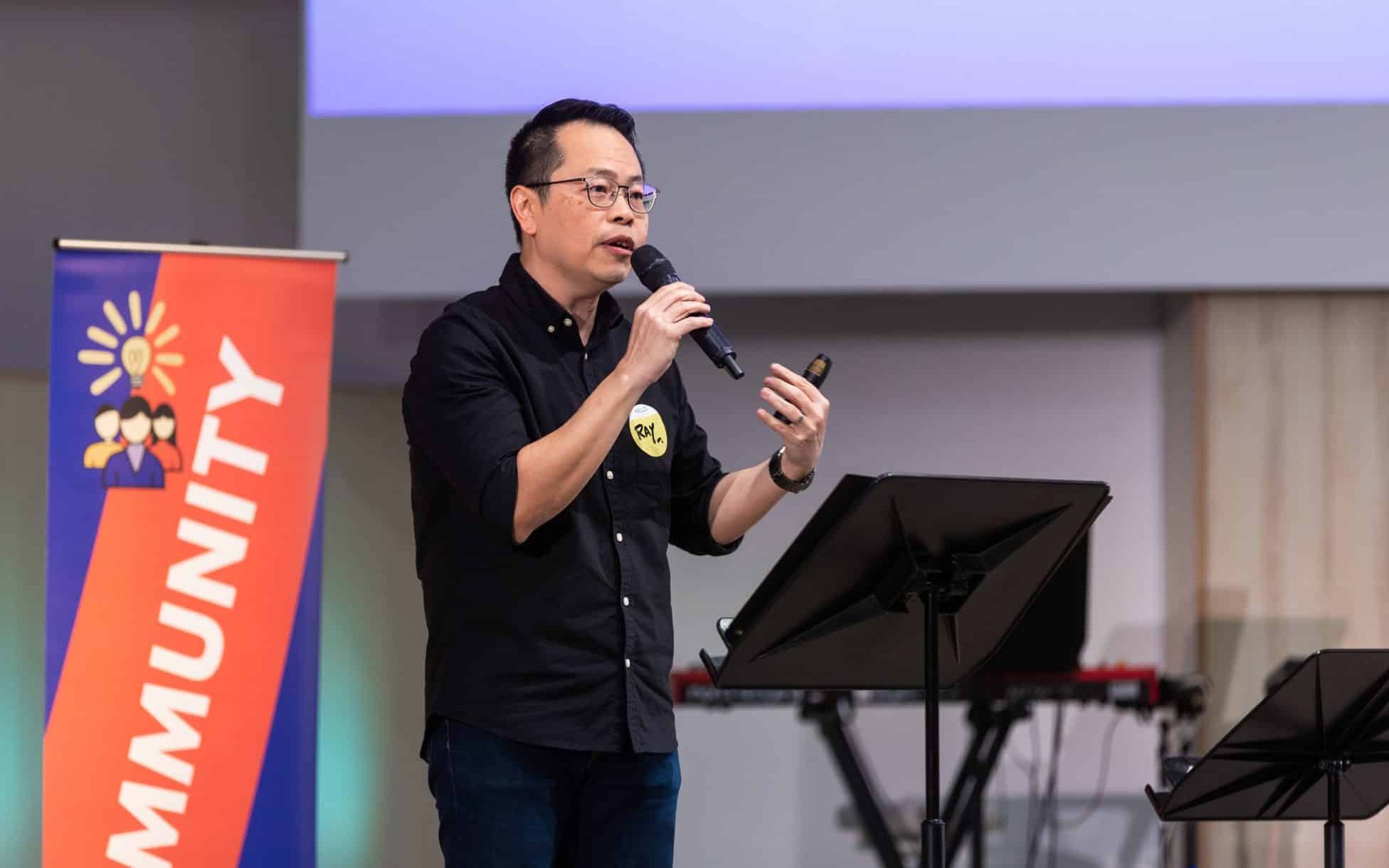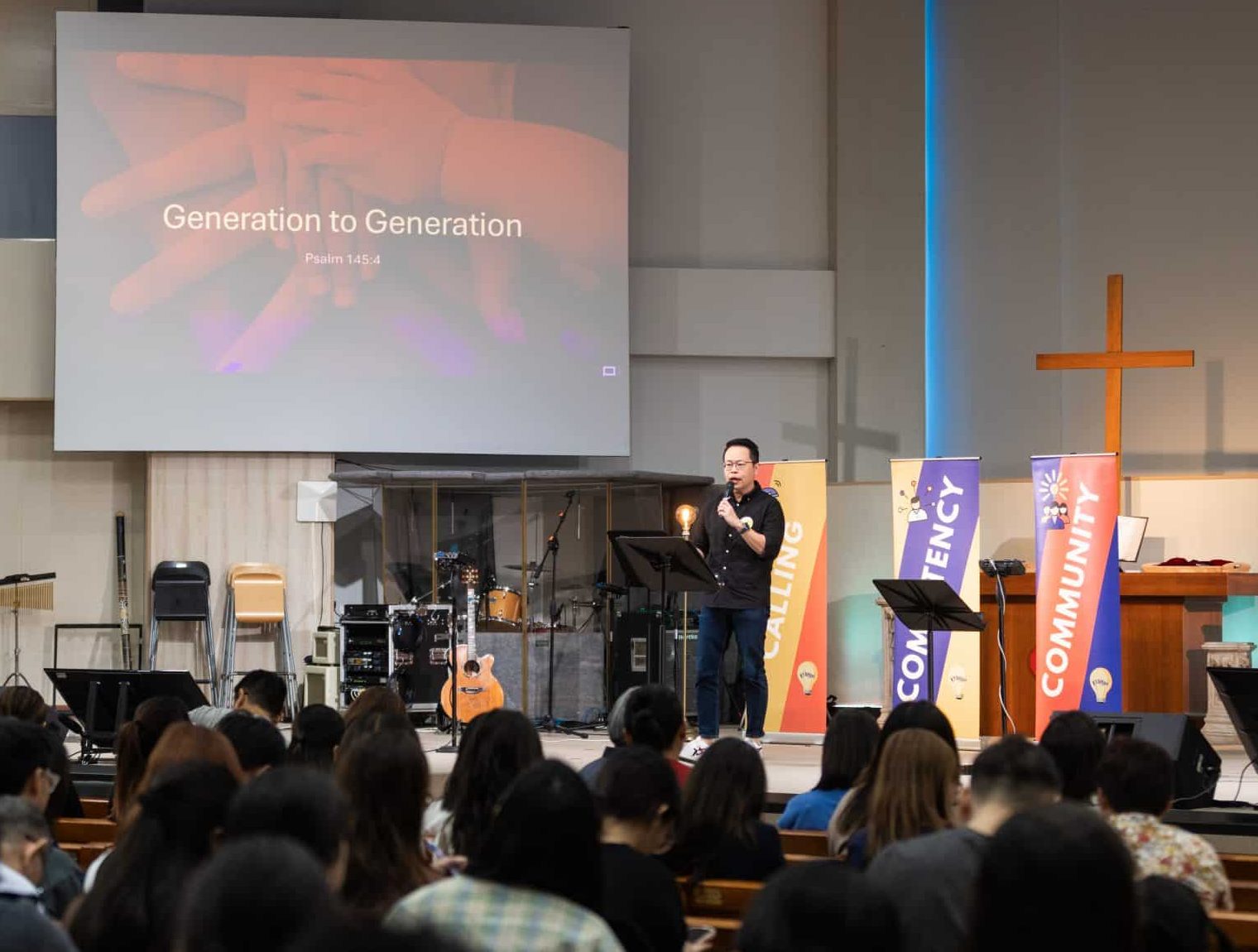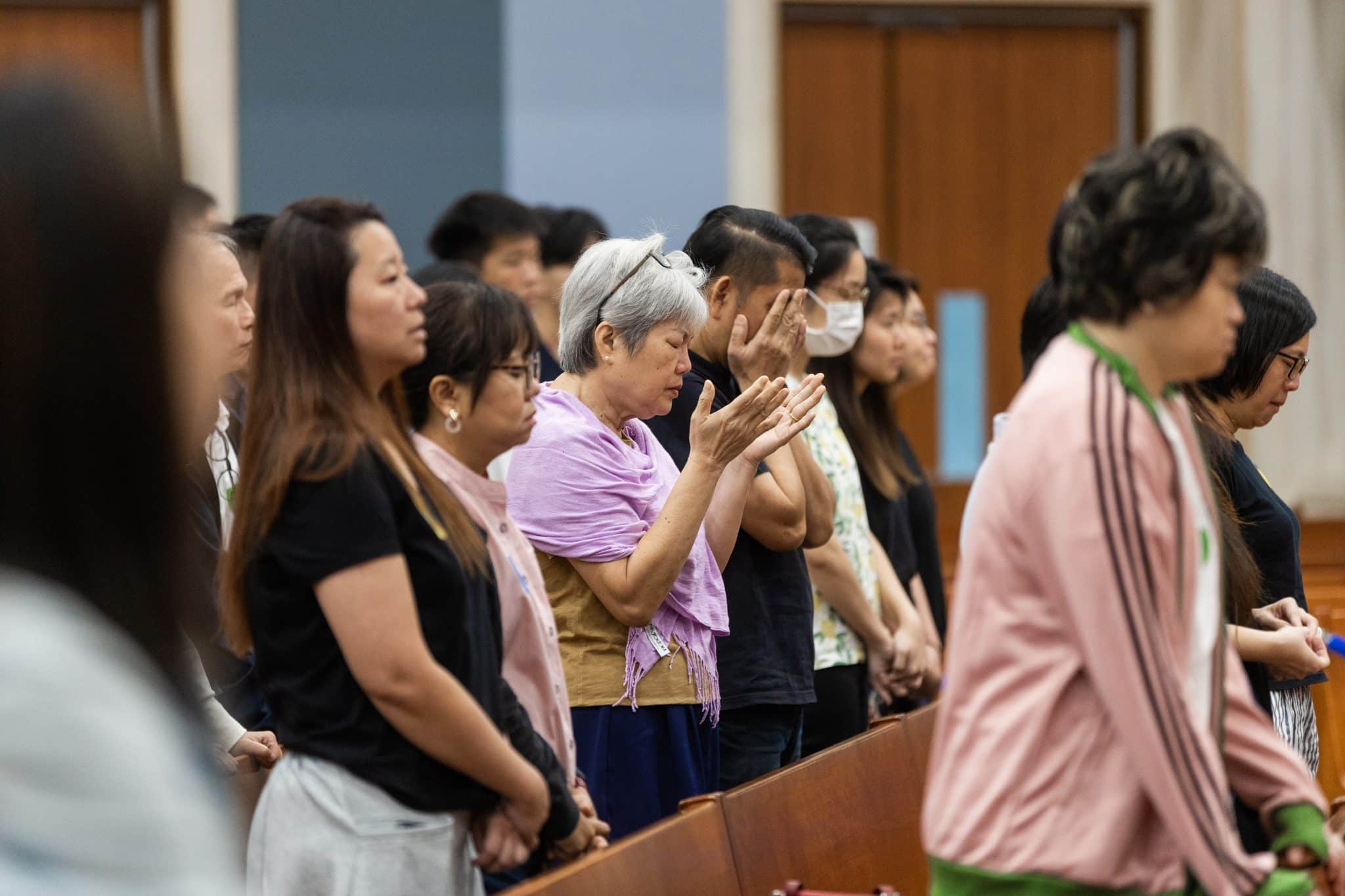“Never pursue God so that you can fulfil a function”: Ps Raymond Fong to children’s ministry leaders
by Gracia Chiang // February 3, 2025, 1:16 pm

At Kidmin Singapore's first event of the year, Rev Raymond Fong shared this piece of advice: Don't pursue God just because you’re a teacher. All photos by Joshua Pwee unless otherwise stated.
It was a call to return to the right posture.
Speaking at Kidmin Singapore’s dedication service, Rev Raymond Fong, Pastor-in-Charge of Wesley Methodist Church, issued an invitation to all present.
“God will call you and empower you, but He does invite you, first and foremost, to pursue Him for who He is,” he said.
“When you do pursue Him, you will then be able to proclaim. Pursue and proclaim – they go together.”
Held annually, KidminSG’s first workshop of the year typically features a time of dedication, where children’s ministry leaders and volunteers come together to dedicate themselves to a new year of service to God.
Almost 200 people representing over 50 churches and agencies attended this year’s event, which was held at Ang Mo Kio Methodist Church on January 18, 2025.
Read on for Ps Raymond’s four points to reflect on.
I want you to know that you’re here because you’re called. You’re called to something larger than yourself.
You’re called to disciple generations – that must be the burden, the passion and the heart. Every year, we go back to the call of God upon our lives.
That’s absolutely critical because when we have served many years, sometimes we lose that sense of call.
Psalm 145:3-6 reminds us of a fundamental call for a generation’s discipleship.
Great is the LORD, and most worthy of praise; his greatness no one can fathom.
One generation commends your works to another; they tell of your mighty acts.
They speak of the glorious splendour of your majesty – and I will meditate on your wonderful works.
They tell of the power of your awesome works – and I will proclaim Your great deeds.

We often think of Psalm 145:4 as a call to disciple the younger generation, but it is a call to disciple all generations, explained Ps Raymond.
I believe it’s in the context of discipleship that we do what we do – each generation must commend God’s greatness and goodness to another generation.
Now we often take verse 4 and we straight away think it’s the next generation, the younger generation. Actually this verse invites us to commend God’s greatness to all generations.
That means you have generations above you and generations below you – it’s up and down. It’s not always down. It’s a clarion call to disciple generations.
Today, I want to share just four key applications.
1. Take responsibility for it even when no one does
Take responsibility for this mandate – the discipleship of the generations – even when no one does.
Intentionality is taking the initiative to say: “Even if no one does it, I’m going to do it.”
You don’t leave commendation of God’s goodness or greatness to chance. You make the most of every opportunity that presents itself.
We seize them as what we call “discipleship moments”.
Deuteronomy 6:6-7 is a very well-known passage that we use very often.
These commandments that I give you today are to be on your hearts. Impress them on your children. Talk about them when you sit at home and when you walk along the road, when you lie down and when you get up.
That means even during Sunday morning, when it’s the non-curriculum time, when you’re just with the kid by the side, these are opportunities for discipleship moments.
As the Lord leads, as the Spirit leads, you seize these moments and take responsibility to commend God’s works.
As you disciple the generations, especially the next generation, also allow them to disciple you.

Our next generation can also teach us about God. Photo by Grace Huang.
Help them tell of God’s goodness. Allow them space to tell of God’s goodness.
It ain’t about you downloading to them all the time. It’s about them telling their stories.
You’ve got to create the space because on their own, they can’t; on their own, they won’t.
But if you help them, they will tell wonderful stories that will disciple you. So it’s not just one way – it’s two way.
Capture those discipleship moments, and allow the next gen to disciple you too.
2. Tell like you really believe it
The Hebrew word for “commend” is this word, shabach. Shabach actually means to praise, to commend, to glorify.
It’s often used in the context of expressing admiration, the approval of who God is, how God is worthy.
If you’re ministering to the next gen, you must tell like you believe it. It’s a certain kind of commendation.
You cannot stand up and praise God and say, “God, you’re worthy, God, you’re good,” but yet your posture does not support it.
Gen Alpha and Gen Z can see through fakeness. There’s a lot of fake stuff going around today on TikTok and Instagram, so they cannot see more pretence on Sunday.
(Church) is a place where there must be genuine belief. I don’t mean fake rah-rah but a consistent conviction that they see week to week.
It’s about a sincerity and a conviction that persists consistently. And it’s a counter-cultural consistency.
It’s not all the ways of the world. It’s the power of God’s conviction and Christ’s power in your life that brings about that deep sincerity.

Reminding teachers that the children look at their example, Ps Raymond said that words and actions must go hand in hand.
So my friends, you have to really believe it. The way we tell it will convey our passion and conviction. Our lives prove it.
If you declare that God is worthy to be praised, then being on time for worship means a lot.
If you say that God is worthy to be praised, then it’s not just the teachers leading the worship (who worship), but also the rest of the teachers preparing the art and craft.
We’re so good in our functions, and we say: “Your job is doing art and craft. Your job is to tell the story. Your job is to lead worship.”
But it’s not just the one leading worship who leads worship. Everyone puts down what they’re doing, joins the children and worships together with the worship leader.
That’s modelling; that’s so powerful.
Beyond that, of course, if you sing and praise that God forgives, then you need to forgive the guy who cuts into your lane.
If your language doesn’t show otherwise, your kids would wonder: “You just said that God forgives, right? What about you?”
If you proclaim that God provides for you, then your generosity will tell the children that God is your Jehovah Jireh, that God is real.
My friend, your life proves it. So tell like you really believe in it.
3. Take on the complexity of it
God’s goodness is often not very apparent today.
How can it be apparent when thousands of people have lost their homes in the Los Angeles fire? How can it be apparent when uncle so-and-so passed on suddenly at the age of 45?
When you talk about God’s goodness to the generations, you cannot disengage from the complexity of things.
We must go beyond platitudes and be willing to engage with the complexity of God’s goodness.
Psalm 145:3 says: “Great is the LORD and most worthy to be praised.” We always end there.
But it goes on to say: “His greatness no one can fathom.”
Help our next generation understand the paradoxes of our faith.
There’s something about the greatness of God that human understanding cannot fathom. Faith must take over.
That’s where you and I must be able to help our next generation, or whichever generation, understand the paradoxes of our faith.
For example, it’s only in dying that we live. It’s only when we’re weak, then we’re strong. It’s only when we’re humble, then we’re raised.
These are what we call Christian paradoxes that we can’t really grasp. We cannot run away from these hard truths.
Don’t just teach them truths; help them understand a Christian worldview.
I really like this quote by Ed Young: “A Christian worldview is the world’s view filtered through God’s truth.”
There’s a view of the world that the world will offer you, but our Christian worldview must be filtered through God’s truth.
This truth is absolute truth, not relative truth. This truth is that God is the source of all truth. This truth is where our entire understanding of our lives is God-centred and not me-centred.
Are we willing to engage our children, our next generation, in very hard, contemporary issues today?
Are we willing to put them into our curriculum, such as talking about Bruno Mars’ song?
We’re very good at teaching the Bible – and that’s our strength. But at some point in time, we must help them understand a Christian worldview.
Sometimes we must transit from just pure truth, to how that truth transforms the way they look at the world, the way they look at friends, the way they look at identity and the way they look at significance.
4. Transform through right posture
Finally, if you want to fulfil your calling and mandate to pass on God’s truths to generations, it must come from an inner posture of the heart.
How do I know this? Because in Psalm 145:5, the psalmist declares: “I will meditate on your wonderful works.”
Look at the contrast, at the way the psalm is structured.
“One generation commends your works… They speak of the glorious splendour of your majesty.” (Psalm 145:4-5a)
But then the psalmist owns it and says, “I”.
“I will meditate on your wonderful works.” (Psalm 145:5b)
There’s a difference between speaking out and meditation.
The Hebrew word for “meditate” is this idea of ruminating, musing, reflecting. It’s this idea of pursuing God for a deeper knowledge of Him.
“I know Your goodness. I know You’re good. But what are You really saying to me?”
The psalmist is pursuing God for that inner place of intimacy.

Want to proclaim God’s goodness to others? Pursue Him first and proclaiming will come naturally.
If you want to commend God’s truth to the next generation, you have to start with the inner posture of resting and pursuing God.
Psalm 90:14 is my favourite verse.
Satisfy us in the morning with your unfailing love, that we may sing for joy and be glad all our days.
I can only declare if I’m first deeply satisfied.
At the start of this year, it’s an invitation to return to the right posture – of pursuing God for yourselves.
“Pursue God because you’re a child of His.”
Never pursue God so that you can fulfil a function. Never pursue God just because you’re called to be a teacher.
I also pray that I will never pursue God just because I’m a pastor.
I will pursue God because, first and foremost, I’m a child of His. I’m His child, and I want to be deeply rested in His love.
This day, would you say: “I will meditate on Your great works. I will learn to love You, grow to love You. That will be my discipleship as I journey through this year.”
Today, would you come to a renewed sense of responsibility? Would you say: “Even if no one does it, I will do it. I will commend Your good works.”
Would you say: “Give me the grace to tell like I really believe it. My life will be the proof of it.”
Would you not run away from the complexity of God’s Word? And would you take time to develop a right posture of the heart?
Would you be deeply rested, satisfied in His love and, out of that place of satisfaction, help our young ones encounter God for who He is?
Missed this? You can also view Ps Raymond’s sharing here. Look out for Part 2 of our event coverage, which features insights on how to teach Gen Alpha from the panel conversation with Elvin and Esther Foong, Carol Loi, Dr Calvin Chong and Ho Wei-Hao.
Started in 2023, KidminSG‘s desire is to help children’s ministry practitioners discover and deepen their calling, build their competencies and belong to a community.
For information on KidminSG‘s upcoming events, check out the banners below.


RELATED STORIES:
Teaching children in church? Kidmin SG wants you to have the 3Cs
Reaching the community for Christ one child at a time: Sonshine Kids
We are an independent, non-profit organisation that relies on the generosity of our readers, such as yourself, to continue serving the kingdom. Every dollar donated goes directly back into our editorial coverage.
Would you consider partnering with us in our kingdom work by supporting us financially, either as a one-off donation, or a recurring pledge?
Support Salt&Light


